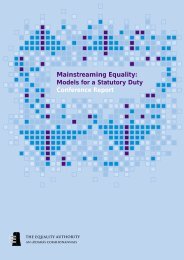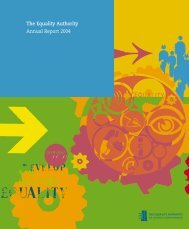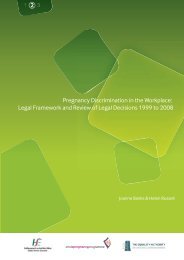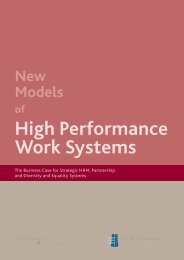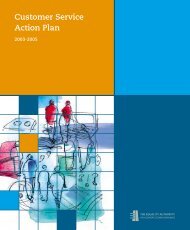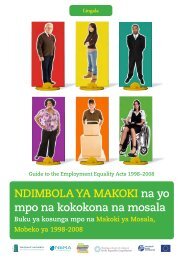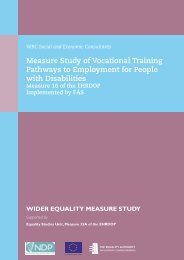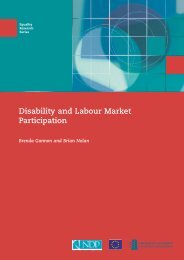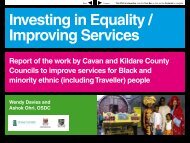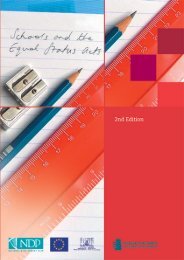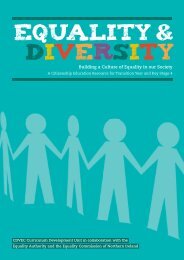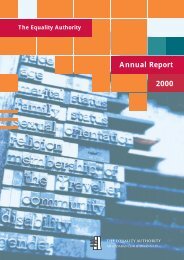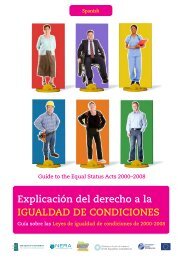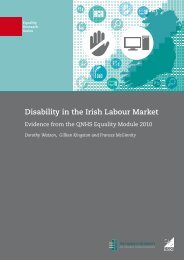Pregnancy and Employment: A Literature Review - Crisis Pregnancy ...
Pregnancy and Employment: A Literature Review - Crisis Pregnancy ...
Pregnancy and Employment: A Literature Review - Crisis Pregnancy ...
You also want an ePaper? Increase the reach of your titles
YUMPU automatically turns print PDFs into web optimized ePapers that Google loves.
<strong>Pregnancy</strong> <strong>and</strong> <strong>Employment</strong>: A <strong>Literature</strong> <strong>Review</strong><br />
over one in 10 mothers (11%) thought they had been treated unfairly at work as a result of their pregnancy, the<br />
same figure as in 2005. These respondents were then asked to select the types of unfair treatment that they had<br />
experienced from a pre-coded list of options; multiple responses were allowed (see Table 2.1). The most common<br />
form of unfair treatment was being given unsuitable work or workloads. Almost one-third experienced unpleasant<br />
comments from colleagues or their employer <strong>and</strong> 21% reported being treated so badly that they had to leave,<br />
which amounts to 2.3% of the whole sample of employees. The survey did not ask respondents if they had been<br />
dismissed or made redundant so the categories are not comparable with those in the EOC survey outlined above<br />
which found that 7% of women were dismissed, made redundant or treated so badly they had to leave due as a<br />
result of their pregnancy (Adams et al, 2005). However, as noted, the results from the MRS are more statistically<br />
robust as they are based on a nationally representative r<strong>and</strong>om sample of women with young children, whereas<br />
the EOC study did not use a representative sampling frame<br />
Women employed in workplaces with no family-friendly working arrangements were significantly more likely to<br />
report unfair treatment (25%) than women in organisations with five or more such arrangements (7%) (La Valle et<br />
al, 2008, p22).<br />
Table 2.1: Types of unfair treatment at work, Maternity Rights Survey 2007<br />
Multiple response Column %<br />
Given unsuitable work or workloads 40<br />
Received unpleasant comments from employer/colleagues 32<br />
Treated so poorly that felt had to leave 21<br />
Discouraged from attending ante-natal classes during work time 20<br />
Unfairly criticised or disciplined about performance at work 18<br />
Failed to gain a promotion it was felt was deserved or otherwise sidelined 16<br />
Denied access to training that would otherwise have received 10<br />
Received a lower pay rise or bonus than peers 8<br />
Had a reduction in salary or bonus 7<br />
Bullied by line manager/supervisor 2<br />
Other type of unfair treatment 19<br />
Base (unweighted) 332<br />
Base: Mothers who reported being treated unfairly during pregnancy in the last pre-birth job.<br />
Multiple responses allowed so figures add up to more than 100%. 332 refers to the number of responses rather than number of individuals.<br />
Source: La Valle et al (2008, p24)<br />
2.5 Women’s Responses to Unfair Treatment<br />
In the Equal Opportunities Commission survey, the majority (55%) of women took no action in response to the<br />
unfavourable treatment they described, 13% took a formal action of some sort <strong>and</strong> a further 34% raised the issue<br />
with an employer/manager (Adams et al, 2005, p58). As mentioned above, less than 4% of women reporting some<br />
form of pregnancy-related discrimination took their case to an employment tribunal; only one woman had won<br />
her case <strong>and</strong> two others were settled (ibid, p62). These figures are broadly similar to those found in an Irish study of<br />
more general discrimination, which found that 60% of those who had experienced discrimination in the preceding<br />
two years took no further action, while only 6% made an official complaint or took legal action (Russell et al, 2008).<br />
The qualitative research by Davis et al (2005) 14 highlighted the strong disincentives to taking a case among those<br />
experiencing discrimination. The authors conducted in-depth interviews with 35 women who had faced some<br />
14 This research was also undertaken as part of the EOC programme of research on pregnancy discrimination in the UK<br />
PAGE 17



